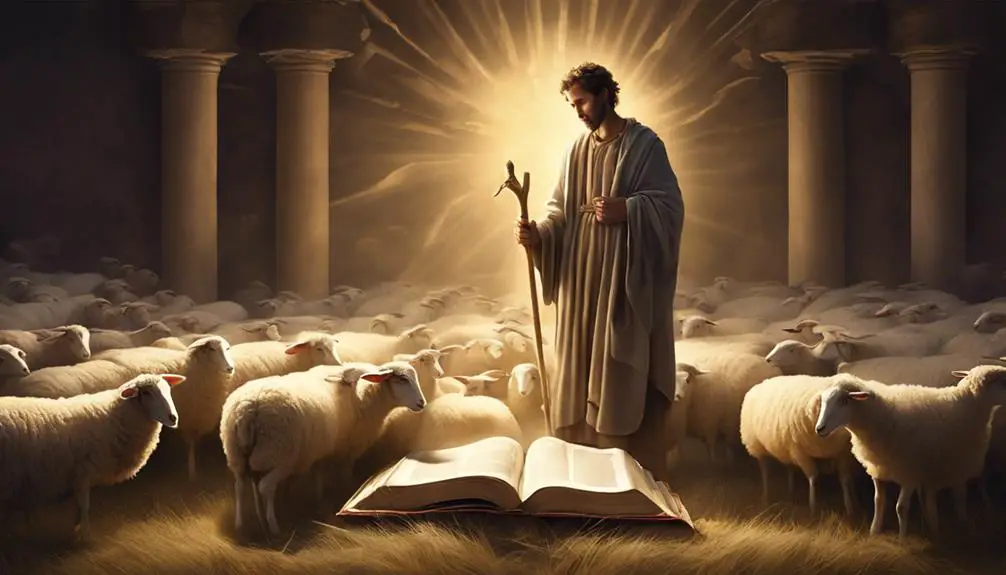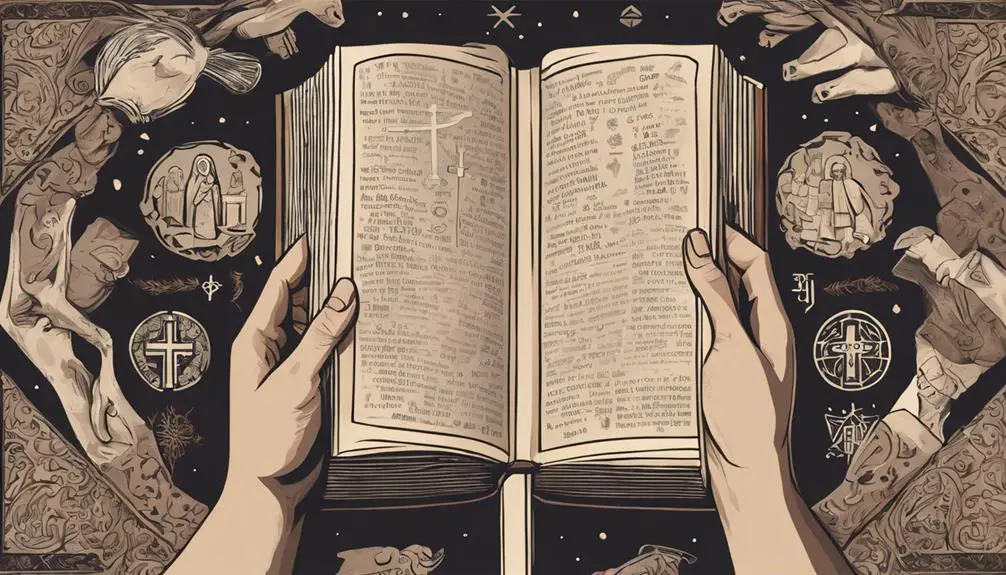Marvel at the rare mention of 'pastor' in the Bible and uncover the evolution of this pivotal role in church leadership.

Is the Word Pastor in the Bible
You might find it surprising to learn that the term 'pastor' is rarely mentioned in the Bible, appearing in its singular form only once in the New Testament. This scarcity raises questions about the biblical foundations of church leadership and the historical evolution of the role commonly known today as 'pastor.'
Understanding the origins and interpretations of this term across different denominations can illuminate how contemporary roles within the church have been shaped over centuries. Exploring this topic further could offer you fresh insights into the complexities of religious leadership and the diverse ways communities of faith understand and apply biblical texts.
Key Takeaways
- The term 'pastor' directly appears sparingly in the Bible, emphasizing the shepherd metaphor for leadership.
- 'Pastor' is derived from the Latin for shepherd, aligning with biblical imagery of guidance and care.
- Ephesians 4:11 includes pastors in a list of roles for building up the church, providing a biblical foundation for the pastoral office.
- Despite limited direct mentions, the pastoral role is deeply rooted in biblical principles of leadership and community care.
Biblical Foundations of Leadership

Exploring the biblical foundations of leadership reveals a complex tapestry of principles and practices deeply embedded in scripture, guiding the faithful in their roles of influence and authority. Central to these principles is the shepherd metaphor, a powerful image that encapsulates the essence of spiritual guidance and oversight. In biblical narrative, the shepherd's role isn't merely about leading sheep from one pasture to another; it's imbued with responsibilities of care, protection, and guidance, offering a profound model for leadership.
This metaphor extends beyond the pastoral imagery, translating into a framework for spiritual leaders who guide their congregations with wisdom, compassion, and an unwavering commitment to their spiritual well-being. The shepherd metaphor underscores the importance of a leader's character, emphasizing qualities such as humility, patience, and steadfastness. These leaders are tasked with navigating their flock through the complexities of faith, providing spiritual guidance that's both nurturing and corrective.
In essence, the biblical foundations of leadership, as illustrated through the shepherd metaphor, establish a paradigm of leadership that's servant-hearted, prioritizing the needs and spiritual growth of the community over personal ambition or gain.
The Term 'Pastor' Explored

Building on the biblical metaphor of the shepherd as a model for leadership, it's crucial to examine the term 'pastor' and its origins within the scriptures. The shepherd metaphor is deeply rooted in biblical language, symbolizing care, guidance, and protection. This metaphor extends to the concept of a pastor, who provides spiritual guidance to their congregation.
When delving into the term 'pastor', consider the following points:
- The term derives from the Latin word 'pastor', meaning shepherd, highlighting the role's pastoral nature.
- In the Bible, the shepherd metaphor is frequently used to describe God's relationship with His people, emphasizing guidance and care.
- The role of a pastor, as it's understood today, aligns with the shepherd's duties of leading, feeding, nurturing, and protecting.
- Ephesians 4:11 is one of the key scriptures that mention pastors, linking them directly to the role of shepherding God's flock.
- Understanding the term 'pastor' within its biblical context underscores the importance of spiritual guidance and leadership in the faith community.
Analyzing the term 'pastor' reveals its deep biblical roots and its significance in providing spiritual guidance, echoing the shepherd metaphor's enduring legacy.
Historical Context of Church Roles

To understand the evolution of church roles, it's essential to delve into their historical context, tracing back to the early Christian communities. These early ecclesiae, or assemblies, operated within a framework that was both communal and spiritual, guided by the teachings and traditions handed down from the apostles. The concept of apostolic succession became a cornerstone for the legitimacy of church leadership, asserting that the authority of church leaders derived directly from the apostles themselves.
As you explore this progression, it's crucial to recognize how these foundational principles shaped the roles within the church. The early ecclesia didn't just serve as a gathering for worship; it was a community where leadership roles were established based on the apostolic teachings and the perceived guidance of the Holy Spirit. These roles evolved, but always with an eye to maintaining the integrity and purity of the faith as it was understood by those first communities.
This exploration into the historical context reveals a complex tapestry of tradition, authority, and community that underpins the concept of pastoral roles. It underscores the importance of apostolic succession in legitimizing the leadership structures that emerged within the early church, providing a framework that has influenced Christian leadership roles throughout history.
Interpretations Across Denominations

The interpretation of pastoral roles varies significantly across different Christian denominations, reflecting a diverse theological landscape. This diversity is evident in several aspects of how the role of a pastor is understood and practiced across the spectrum of Christian faith traditions.
- Clerical Attire: In some denominations, specific clerical attire is seen as an important symbol of the pastoral office, whereas in others, no particular dress code is enforced, reflecting a more informal approach to ministry.
- Ordination Practices: The process and requirements for ordination can differ greatly, with some denominations emphasizing formal theological education while others prioritize practical ministry experience or a perceived calling.
- Governance Structures: The authority and autonomy granted to pastors can vary, influenced by the broader ecclesiastical governance model of the denomination.
- Sacramental Duties: The role of pastors in administering sacraments (e.g., communion, baptism) can differ, with some denominations restricting these duties to ordained clergy only.
- Pastoral Counseling: Expectations regarding pastoral counseling and spiritual guidance vary, with some denominations offering specific training and certification for pastors in this area.
Across denominations, these differences underscore the complexity and richness of Christian ecclesiology and the pastoral vocation within the global church.
Evolving Understanding of Pastoral Duty

As we examine the evolving understanding of pastoral duty, it's clear that shifts in societal values and technological advancements have significantly influenced how pastoral roles are conceived and enacted today. The traditional shepherd imagery, with its roots in pastoral care and guidance, still serves as a foundational metaphor. However, the application of this role has expanded and adapted to meet modern challenges.
Pastors are now navigating a complex landscape where digital communication intersects with the need for personal connection, demanding a reevaluation of pastoral methods. You're observing a transformation in how spiritual guidance is delivered; sermons are streamed online, pastoral care extends through social media, and digital platforms are utilized for community building. This shift requires pastors to develop new skills and adapt to technologies that were unimaginable in previous generations.
Moreover, societal shifts towards inclusivity and social justice have broadened the pastoral duty beyond spiritual care to encompass advocacy and community engagement. Pastors now grapple with issues of social inequality, environmental stewardship, and global crises as part of their calling.
This evolving landscape challenges pastors to balance tradition with innovation, shepherd imagery with modern realities, and spiritual care with societal engagement. It's a dynamic journey of adaptation and growth, reflecting the complexities of leading in today's world.
Frequently Asked Questions
How Has the Role of a Pastor Changed in the Digital Age, Particularly With the Rise of Online Churches and Streaming Services?
In the digital age, you've witnessed pastors adapting to virtual congregations and digital evangelism. They've transitioned from traditional pulpits to online platforms, reaching a broader audience through streaming services.
This shift has expanded their role beyond physical church boundaries, allowing them to connect with followers globally. They're now tasked with engaging communities online, navigating the challenges of digital communication, and maintaining the essence of their spiritual guidance in an ever-evolving technological landscape.
Can Women Be Pastors According to Different Contemporary Theological Perspectives, Outside Traditional Interpretations?
You're delving into whether women can be pastors, focusing on contemporary theological perspectives beyond traditional views. This debate centers on gender theology and scriptural interpretations. Scholars analyze texts and societal contexts to argue for or against women's pastoral roles. Some posit that evolving understandings of scripture support women pastors, while others hold to historical interpretations.
Your exploration reveals a nuanced dialogue, reflecting broader discussions on gender roles within religious communities.
Are There Examples of Pastoral Roles or Equivalents in Non-Christian Religions, and How Do They Compare?
Yes, non-Christian religions have roles similar to pastors.
In Hinduism, the priesthood performs rituals and guides the community spiritually, akin to pastoral duties.
Shamanic practices across various cultures involve individuals acting as intermediaries between the spiritual and physical worlds, offering guidance, healing, and leadership.
These roles, while distinct in their practices and beliefs from Christian pastors, serve comparable functions in providing spiritual leadership and community cohesion.
How Does the Concept of a Pastor Intersect With Mental Health Support in Modern Communities?
You're exploring how pastors contribute to mental health support in modern communities. They often stand at the crossroads of community resilience, providing emotional support that's crucial in times of crisis.
What Are the Legal and Financial Responsibilities of Pastors in Various Countries, Beyond Their Spiritual Duties?
You're looking into pastors' legal and financial responsibilities across different nations, beyond their spiritual roles. It's essential to understand how tax regulations and charity management intersect with these duties.
Countries vary in their expectations, but generally, pastors must navigate complex legal landscapes, ensuring compliance with tax laws and ethical management of charitable funds. This analysis reveals a multifaceted role where financial acumen and legal knowledge are as crucial as spiritual leadership.
Conclusion
In conclusion, you've explored the biblical roots of leadership, specifically the term 'pastor.' This journey through scripture, history, and denominational interpretations reveals the complexity of church roles.
It's clear that the understanding of pastoral duty has evolved, reflecting shifts in societal and theological perspectives.
This analysis underscores the importance of context in interpreting roles within the church, illustrating that while the essence of pastoral care remains, its execution is subject to the changing dynamics of faith communities.



Sign up